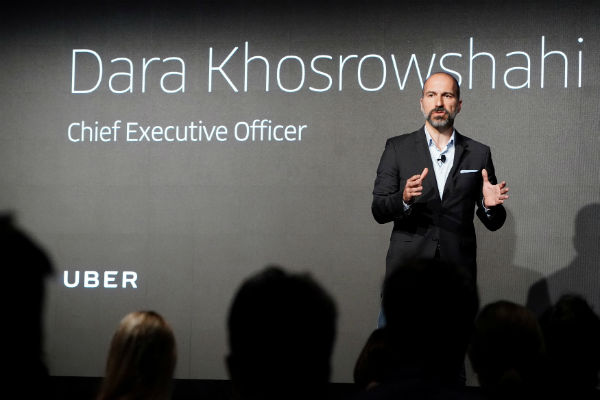Company has repeatedly ‘broken their promises’: Driver

LONDON/NEW YORK (Reuters) — Uber drivers in London and New York started a day of strikes on Wednesday to protest the disparity between gig-economy conditions and the sums that investors are likely to make in Friday’s blockbuster stock market debut.
Drivers and regulators around the world have long criticized the business tactics of Uber Technologies Inc, and the expected US$90 billion valuation in its initial public offering on Friday is proving to be the latest flashpoint.
Unions in Britain said support for the strike was strong, with drivers staying at home and passengers using the #UberShutDown hashtag to pledge solidarity on social media. The Uber app indicated fares were higher in London during a rainy morning rush hour due to increased demand.
“Stand with these workers on strike today, across the UK and the world,” said Jeremy Corbyn, the leader of Britain’s opposition Labour Party.
Drivers in London were due to log off the app between 7 a.m. and 4 p.m. local time, before counterparts in New York, Chicago, Los Angeles, San Francisco and other major cities joined in.
Uber has three million drivers globally, and it is not clear if the action would significantly slow service, although organizers have received widespread publicity.
Chief Executive Officer Dara Khosrowshahi, hired to help move the company past a series of scandals and manage the IPO, has promised to treat drivers better. Uber is paying more than a million drivers about US$300 million in one-time bonuses, for instance, and has changed policies such as allowing riders to tip.
“Whether it’s being able to track your earnings or stronger insurance protections, we’ll continue working to improve the experience for and with drivers,” the company said.
Uber has steadfastly, and mostly successfully, beaten back attempts to compel it to treat drivers as employees, arguing that its main business is a platform that brings riders and drivers together. And the money-losing company is under pressure to cut costs.
“It is the drivers who have created this extraordinary wealth but they continue to be denied even the most basic workplace rights,” said James Farrar, chair of Britain’s United Private Hire Drivers, calling for a “digital picket line.”
Many drivers want better pay from Uber rival Lyft as well.
“I’m striking because Uber has broken their promises to drivers time and again,” said Syed Ali, an Uber driver and member of the striking New York Taxi Workers Alliance, in a statement. “They have grown and grown and gotten richer and richer, but I haven’t grown with the company. My condition as an Uber driver has gotten worse and worse.”
It was not clear how many drivers were participating in the U.S. strikes. U.S. representatives for Uber and Lyft did not immediately respond to calls for comment early Wednesday.
Uber and Lyft have cut back on incentives and bonuses in more established markets to attract new drivers. They have also devised more complicated formulas for determining what riders pay and what drivers earn.
Both companies recently slashed the per-mile rate drivers earn in Los Angeles and San Francisco, and some drivers estimated a loss of 10 per cent to 20 per cent in earnings. Lyft said its hourly wages have risen over the last two years and average more than US$20 per hour.
The company and its critics are divided over how much drivers can make. Classified as independent contractors, they lack paid sick and vacation days and must pay their own expenses, such as car maintenance and gasoline.
Uber noted that a recent study whose authors included current and former Uber employees showed driver gross earnings averaged US$21 an hour. But a study by left-leaning Washington think tank Economic Policy Institute calculated that after costs, Uber drivers earned US$9.21 an hour.




